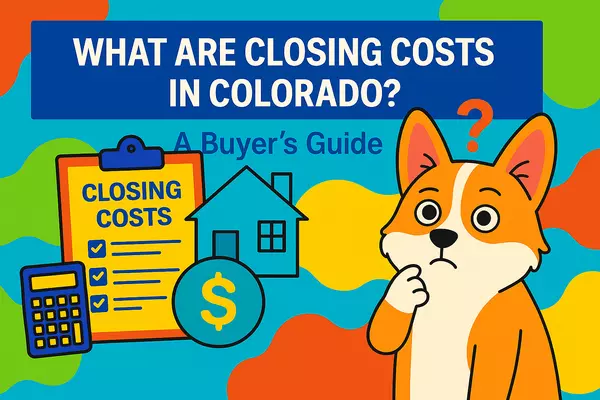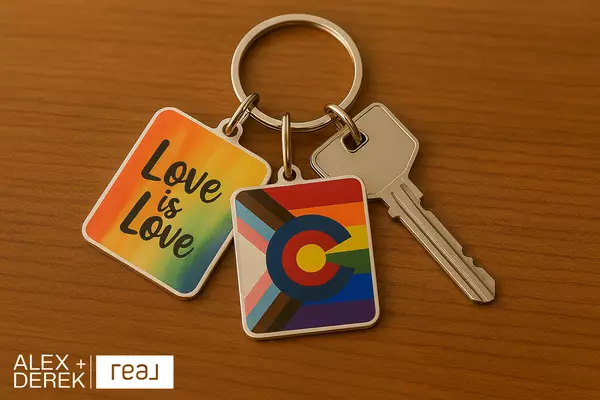First-Time Homebuyer Programs in Colorado: What You Need to Know

Buying your first home is exciting, but it can also feel overwhelming when you start looking at loan options, down payments, and closing costs. The good news is that there are several programs designed specifically to help first-time homebuyers in Colorado. Some are nationwide, some are statewide, and others are local to the Denver metro area. Here's a breakdown to help you understand what's available.
National Programs for First-Time Buyers
While these programs are available across the country, they're especially popular with first-time buyers because of their flexible requirements:
-
FHA Loan: Backed by the Federal Housing Administration, this program allows you to buy with as little as 3.5% down and more flexible credit guidelines.
-
VA Loan: For veterans, active-duty service members, and some surviving spouses. VA loans offer 0% down, no private mortgage insurance (PMI), and competitive interest rates.
-
USDA Loan: For homes in designated rural areas. USDA loans also allow 0% down with income limits that vary by county.
-
Conventional 97 Loan (HomeReady/Home Possible): These Fannie Mae and Freddie Mac programs let you buy with just 3% down. At least one borrower must be a first-time buyer, and income limits apply. They also feature reduced PMI, which can make them cheaper than FHA long-term.
Colorado State Programs
Colorado has unique resources that give buyers extra support beyond national loan products:
CHFA (Colorado Housing and Finance Authority)
CHFA is one of the most widely used first-time homebuyer programs in the state. It's a go-to for buyers who need help with the upfront costs of buying a home, but it does come with trade-offs. Here's what to know:
-
Down Payment Assistance: CHFA offers assistance either as a grant (which doesn't have to be repaid) or as a second mortgage with very low interest. This can cover some or all of your down payment and closing costs, making it possible to get into a home with only a few thousand dollars out of pocket.
-
Lower Mortgage Insurance Options: Through CHFA Advantage and CHFA Preferred, buyers can access conventional loans with reduced mortgage insurance (MI), which helps keep monthly costs lower compared to FHA.
-
Tax Savings: CHFA can be paired with a Mortgage Credit Certificate (MCC), which gives you a federal tax credit on part of the mortgage interest you pay each year.
-
Education Requirement: Buyers must complete a homebuyer education class (typically around $75). This is part of CHFA's mission to set you up for long-term success.
-
Rates and Fees: CHFA interest rates are usually a bit higher than standard market rates (often 0.25%-0.50% higher). They also include a small funding fee ($100). The higher rate essentially "pays for" the assistance you're receiving. Compared to a market-rate loan, your monthly payment could be $75-$100 higher, but you're saving thousands at closing.
-
The Trade-Off: For many first-time buyers, not having to bring $15,000-$20,000 to the table is worth paying a little more each month. It's about making homeownership possible sooner, rather than waiting years to save up a full down payment.
👉 In short: CHFA isn't always the cheapest long-term option, but it's one of the most powerful tools for first-time buyers in Colorado who need help getting started.
Colorado First-Time Homebuyer Savings Account (FHSA)
This state tax-advantaged account allows you (or even your parents or grandparents) to save up for your first home in Colorado.
-
Tax Benefits: Contributions up to $14,000 per year ($28,000 for joint filers) can be deducted from your Colorado state taxable income. Interest and gains grow tax-free at the state level.
-
Limits: Lifetime contribution cap of $50,000 and total account value cap (including earnings) of $150,000.
-
Eligible Uses: Funds can be used for down payment and closing costs on your first Colorado home. If used for anything else, you'll owe back taxes and a penalty.
-
Family Contributions: Parents and grandparents can open their own FHSA accounts and name you as the beneficiary. They get the state tax deduction, and the funds are earmarked for your future home. They can also contribute to an account you've set up yourself.
Where to Open an FHSA:
-
Any Colorado-based bank or credit union can set one up as a savings account, CD, or money market account.
-
Common places people open them:
-
Large Colorado banks (FirstBank, U.S. Bank, Wells Fargo branches in CO)
-
Local credit unions (Ent Credit Union, Bellco, Canvas, Elevations)
-
-
Pro tip: When setting it up, make sure the bank or credit union designates the account properly as an FHSA under Colorado law so you'll have the documentation needed at tax time.
Local Colorado Metro Programs
If you're buying in the Denver metro area, you may also qualify for additional local programs:
Metro Mortgage Assistance Plus (MMAP)
-
A down payment and closing cost assistance program available in Denver and many surrounding cities (Aurora, Arvada, Lakewood, Littleton, Thornton, Westminster, and more).
-
Offers a grant of up to 4-5% of your loan amount.
-
The grant does not need to be repaid.
-
Income and purchase price limits apply, and you'll need to work with a participating lender.
-
Interest rates are typically higher than market rates, since the program is giving you assistance that never has to be repaid.
MetroDPA (Metro Down Payment Assistance Program)
-
Also sponsored by the City and County of Denver, but structured differently than MMAP. These are also offered in the surrounding counties.
-
Provides up to 6% in down payment assistance, given as a 0% interest, forgivable second mortgage.
-
The second mortgage is fully forgiven after 3 years if you remain in the home. If you sell or refinance before then, you repay a prorated portion.
-
No first-time homebuyer requirement.
-
Income limit is higher than MMAP (currently around $176,700 household income).
-
Purchase price limit is tied to conforming loan limits (around $806,500 for most Denver metro counties).
-
Like MMAP, interest rates are higher than standard loans to offset the cost of the assistance but there have been new options to do rate buydowns.
Aurora Home Ownership Assistance Program
-
Separate from MMAP and MetroDPA, Aurora also offers up to $10,000 toward down payment and closing costs in the form of a forgivable loan.
-
Forgiven after a set number of years if you stay in the home.
👉 Quick Comparison:
-
MMAP = Grant (4-5% assistance, no repayment ever, higher rates).
-
MetroDPA = Forgivable 2nd mortgage (up to 6% assistance, forgiven after 3 years, also higher rates).
-
Aurora Program = Smaller forgivable loan ($10,000, longer forgiveness period).
All three programs can be great tools depending on how long you plan to stay in the home and how much upfront help you need.
Which Program Is Right for You?
-
If you're looking for the lowest possible down payment and flexible credit, FHA or CHFA might make sense.
-
If you have strong credit and want to save on monthly PMI, HomeReady or Home Possible could be a better fit.
-
If your main challenge is saving enough cash upfront, local grants like Metro Mortgage Assistance Plus or MetroDPA can help you bridge the gap.
-
And if you're planning ahead, the Colorado First-Time Homebuyer Savings Account is a smart way to lower your state taxes while building up your down payment fund.
Final Thoughts
The key takeaway is this: you don't have to go through the homebuying process alone, and you don't necessarily need 20% down to buy your first home in Colorado. Between national, state, and local programs, there are many ways to make homeownership more affordable.
If you're ready to take the first step, we'd be happy to help you get to know these programs inside and out and help you figure out which ones fit your situation best.
Categories
Recent Posts











